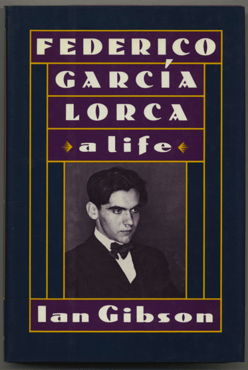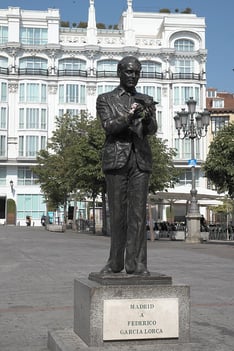There’s an ongoing campaign in Spain to locate mass graves of victims who were executed during the early days of the Spanish Civil War and through the decades of the fascist Francisco Franco’s dictatorship in the country. With 15,000 euro, archaeologists have identified regions in which bodies may have been buried. One of those bodies is likely the remains of the playwright and poet Federico García Lorca.
Madrid During the Early Days of Dictatorship
 In the early 2000s, a historian from García Lorca’s southern Spanish city of Granada, Miguel Caballero Pérez, began “sifting through police and military archives to piece together the last 13 hours of the life of the author of Blood Wedding, Yerma, and The House of Bernarda Alba, who was shot by a right-wing firing squad early in the Spanish civil war." For opposing Franco, García Lorca lost his life.
In the early 2000s, a historian from García Lorca’s southern Spanish city of Granada, Miguel Caballero Pérez, began “sifting through police and military archives to piece together the last 13 hours of the life of the author of Blood Wedding, Yerma, and The House of Bernarda Alba, who was shot by a right-wing firing squad early in the Spanish civil war." For opposing Franco, García Lorca lost his life.
Prior to his death, the poet had been living in Madrid, where he befriended Pablo Neruda. In Neruda’s Memoirs, he wrote of García Lorca, “He was happy. He was always like that. Happiness was as much a part of him as his skin...his was a magnetic joyfulness that generated a zest for life in his heart and radiated it like a planet.” Together, they worked on the poetry journal Caballo Verde, whose first issue featured “of course the poems of Federico,” Neruda inscribed in his autobiography. When news of García Lorca’s execution reached his circle of friends in Madrid, Neruda was devastated. He wrote of his friend’s death:
“Federico García Lorca was not merely shot; he was assassinated. It would never have crossed anyone’s mind that they would kill him one day. He was the most loved, the most cherished, of all Spanish poets, and he was the closest to being a child, because of his marvelous happy temperament. Who could have believed there were monsters on this earth, in his own Grenada, capable of such an inconceivable crime?”
Uncovering the Truth About García Lorca’s Execution
 When Caballero Pérez first started his archival work on the poet’s demise, he wasn’t sure what he’d find. By the time he published his book The Last 13 Hours of García Lorca, Caballero Pérez reportedly “identified the half-dozen career policemen and volunteers who formed the firing squad that shot Lorca and three other prisoners, as well as the burial site,” according to a 2011 article in The Guardian.*
When Caballero Pérez first started his archival work on the poet’s demise, he wasn’t sure what he’d find. By the time he published his book The Last 13 Hours of García Lorca, Caballero Pérez reportedly “identified the half-dozen career policemen and volunteers who formed the firing squad that shot Lorca and three other prisoners, as well as the burial site,” according to a 2011 article in The Guardian.*
García Lorca is one of about 3,500 people who remain missing and are believed to be buried in close proximity to one another. An official with the regional government of Andalucía emphasized that the excavation work being conducted around Granada is a search for the beloved poet, but also for the thousands of other victims of Franco’s regime. In the last few years, thousands of dollars have gone into forty similar excavation projects, all aimed at finding the graves of persons executed during the dictatorship of Franco. Locating the poet’s remains, however, “is like finding a needle in a haystack,” the Andalucían official lamented.
The excavation ultimately failed in locating García Lorca’s remains this time around, yet continued investigations into the poet’s grave site have brought to light other significant information. For example, documents drafted in 1965 at the Granada police headquarters contain admissions from officials in the Franco regime about their role in García Lorca’s death. The recent documents are more than fifty years in the making. Indeed, they were written in response to a French author, Marcelle Auclair, who had been looking into the poet’s death in the 1960s. According to The Guardian, the documents reveal that
“García Lorca was arrested and taken by car to an area close to the place known as Fuente Grande, along with one other detainee...He was then executed immediately after having confessed, and was buried in that location, in a very shallow grave, in a ravine.”
While the poet’s remains have yet to be found, the continued search is a reminder that the wounds of the Spanish Civil War and Franco’s dictatorship endure in contemporary Spain.
*For more from The Guardian, click here.









